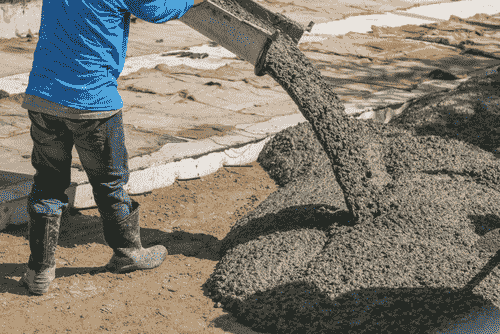Unveiling the Eco-Friendly Advantages of Using Recycled Concrete in Sustainable Building Practices
In the realm of sustainable construction practices, the application of recycled concrete stands as an essential yet usually undervalued source. Beyond its conventional applications, recycled concrete offers a myriad of environmentally friendly advantages that expand much past the confines of traditional building and construction products. From minimizing environmental impact to boosting cost-efficiency, the effects of integrating recycled concrete in sustainable structure methods are considerable. This versatile product not just addresses pressing ecological worries but also offers a feasible solution to the obstacles dealt with by the construction sector at big.
Environmental Benefits
By integrating recycled concrete into building and construction practices, there is a substantial decrease in the need for brand-new raw materials, leading to preservation of natural sources. Furthermore, the use of recycled concrete diminishes the quantity of waste being sent out to garbage dumps, thereby lowering ecological contamination and minimizing the strain on land fill abilities (Concrete).

Furthermore, the production of traditional concrete is a significant resource of carbon discharges because of the energy-intensive process of cement production. In comparison, recycled concrete has a lower carbon footprint as it reduces the need for brand-new concrete manufacturing. This reduction in carbon emissions adds to mitigating environment modification and supports sustainable construction methods. In general, the ecological benefits of utilizing recycled concrete are substantial and play a crucial role in promoting green construction methods.
Cost-Efficiency
When analyzing the usage of recycled concrete in building and construction projects,Accomplishing cost-efficiency is a paramount consideration. Among the key benefits of using recycled concrete is its cost-effectiveness compared to typical concrete. The production of recycled concrete entails less power and resources as it utilizes existing materials, lowering the general project prices substantially. Furthermore, the availability of recycled concrete in your area can additionally decrease transportation costs, making it a much more economical choice for building and construction tasks.
Additionally, using recycled concrete can cause cost savings in landfill prices by diverting concrete waste from disposal websites. This not only minimizes the environmental effect but also gets rid of the expenses associated with waste elimination. In addition, the toughness and efficiency of recycled concrete are comparable to traditional concrete, ensuring that cost financial savings do not endanger the top quality of the building and construction.
Longevity and Toughness
Thinking about the considerable cost-efficiency advantages of using recycled concrete, it is crucial to analyze its longevity and toughness in building applications. Recycled concrete deals equivalent, if not premium, toughness and stamina residential or commercial properties to typical concrete. With innovations in handling strategies and quality assurance, recycled concrete can fulfill or surpass the performance requirements of standard concrete. The procedure of reusing concrete includes crushing, arranging, and screening old concrete to create aggregates that can be used in brand-new building projects. These recycled aggregates are capable of providing satisfactory compressive stamina, resilience, and long-lasting efficiency.
:max_bytes(150000):strip_icc()/in-depth-look-at-concrete-flooring-1314684-02-8fdb599f92a747ed94ef5b96110abfc1.jpg)
Waste Decrease
Efficient waste reduction techniques play an important duty in the sustainable use of sources within the construction market. this hyperlink Waste reduction is a crucial advantage that contributes considerably to ecological conservation when it comes to utilizing recycled concrete. Traditional building techniques usually generate substantial amounts of waste, particularly in the form of concrete rubble from demolition sites. By incorporating recycled concrete into construction projects, this waste is repurposed and diverted from landfills, decreasing the overall environmental impact of construction activities.
Recycled concrete not just aids in lessening the amount of waste that winds up in landfills yet likewise saves natural resources by lowering the need for brand-new accumulated products. This process of waste reduction promotes a circular economy within the building and construction field, where products are recycled and reused to develop an extra sustainable industry. Furthermore, using recycled concrete can cause cost savings for building and construction jobs, as it is typically a lot more budget friendly than sourcing and carrying brand-new materials. To conclude, waste reduction with the use of recycled concrete is an essential component of sustainable construction practices that benefits both the atmosphere and the building market as a whole.
Power Conservation
When it comes to utilizing recycled concrete in building and construction, considerable energy savings are achieved compared to standard concrete manufacturing. The process of producing recycled concrete involves recycling and crushing existing concrete products, which eats less energy than mining, handling, and moving raw products for new concrete production.
Verdict
Finally, the usage of recycled concrete in sustainable building and construction techniques uses numerous ecological benefits, cost-efficiency, sturdiness, strength, waste decrease, and energy preservation. By integrating recycled concrete into building and construction jobs, we can add to an extra sustainable and environmentally friendly future. It is vital for the building market to prioritize making use of recycled materials to help in reducing the environmental effect of building and construction activities.
One of the essential advantages of making use of recycled concrete is its cost-effectiveness contrasted to standard concrete.In addition, the usage of recycled concrete can lead to financial savings in garbage dump prices by drawing away concrete waste from disposal sites. The resilience and efficiency of recycled concrete are comparable to conventional concrete, making certain that great site price financial savings do not jeopardize the top quality of the building and construction.
